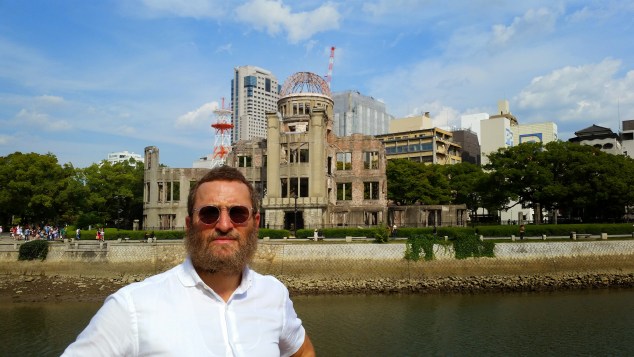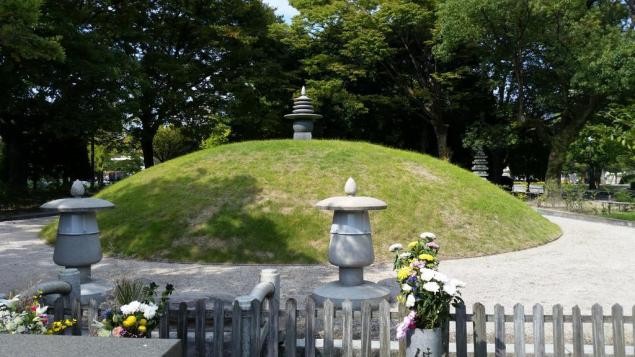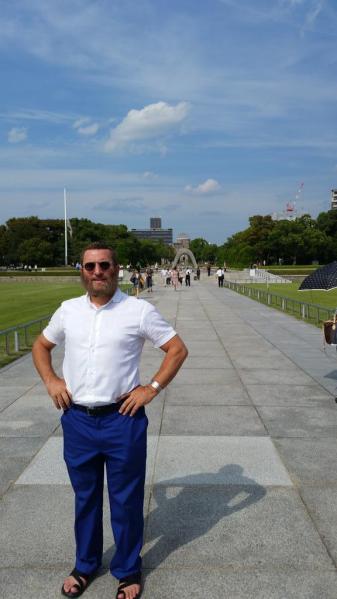
Visiting Hiroshima as an American can be perplexing. On the one hand, there is the understanding that it was our government that dropped an atomic bomb on the city and its military and civilian residents. On the other hand, one experiences little collective American guilt for having done so. While one absolutely commiserates with the horrific plight of the victims and greatly laments the loss of life, one does not have the feeling that this was the product of an American nuclear holocaust.
I certainly did not feel that way. Nor did I see that sentiment in the eyes of the other American tourists whom I encountered.
This is radically different from German tourists who visit places like the Holocaust Museum in Washington, D.C. where you can witness a palpable feeling of discomfort on their faces.
Of course, their generation is in no way guilty for the sins of their fathers. The Bible, for example, preaches horizontal but not vertical accountability. Their parents who voted for Hitler and kept him in power for 12 years are fully accountable for the crimes of the Nazi government. Their children, however, are not.
Having said that, being German lends them a feeling of unease, as if they have to confront the fact that a nation of which they are a part undertook horrors of unimaginable and unspeakable cruelty.
But we Americans accept that whatever the tragedy of Hiroshima it was not done out of spite, hatred, or malice but of military necessity. It did not reflect American evil or cruelty but an inescapable and ugly necessity of war.
I fully recognize that this is a debatable point. Indeed, at the Hiroshima Museum commemorating the atomic blast and its victims there is an exhibition which focuses on the reason the United States dropped the bomb. The essential argument it offers is that America wanted to frighten the Soviet Union to keep it in check and wanted to justify, for domestic consumption, the $2 billion cost of the bomb’s development.

It goes without saying that this is a highly prejudiced – some would say, highly anti-American – reading of history. Are we really to believe that the United States dropped the bomb simply because it had already spent the money? Would a Japanese museum really go so far as to argue that the American government incinerated 80,000 people – and ultimately killed 160,000 – just to make a point to the Soviets and to make sure it got a bang for its buck, quite literally?
Nonsense.
The inescapable truth is – as most historians accept and as Harry Truman himself explained – the United States decided to drop the bomb because of fanatical Japanese militarism and the belief that an American invasion would lead to 1 million more American casualties. The Japanese had been given an ultimatum at the Potsdam Conference in July, 1945 to end the war or face further ruin. They elected to continue a lost contest. The bomb’s dropping was designed for one principal purpose: to bring an immediate end to the war. While we can debate many things about the Second World War one point is beyond argument: the atomic bombings of Hiroshima and Nagasaki led to Japan’s immediate surrender.

In the nearly 70 years since the bomb’s detonation the United States as a nation has not seriously questioned its morality. Over my 47 years I’ve seen some small debates about Hiroshima in my home country, like the wording of the Enola Gay exhibition at the Smithsonian in Washington. But I have never seen any serious national soul-searching about whether or not we should have dropped the bomb. This is not because Americans lack introspection. To the contrary, we are a deeply moral nation that constantly debates the justice of the wars in Vietnam and Iraq.
But when it comes to Imperial Japan and Hiroshima, the American consensus is that Hiroshima was a brutal, horrific, yet justified attack because it ended the four years of carnage.
All agree that it was horrible beyond description and yet there is a consensus that there was simply no choice.
Perhaps this is the reason why at the Museum in Hiroshima the only American president depicted as having visited to lay a wreath is Jimmy Carter. I cannot imagine this is because other presidents did not commiserate with the suffering of the Japanese people. But they feared that their presence at Hiroshima would convey some kind of American guilt – the kind that Jimmy Carter excels at – so they stayed away.
Having said that, the decision to drop the bomb no doubt embraced a tinge of American feeling that the Japanese – in their extreme brutality, lust for conquest, and unending crimes against humanity – had it coming, especially after their unprovoked attack on Pearl Harbor and indiscriminate slaughter of unsuspecting American servicemen. President Truman nearly said as much in his famous announcement of the atomic attack: “The Japanese began the war from the air at Pearl Harbor. They have been repaid many-fold, and the end is not yet.”
In the final analysis, the American decision to drop the atomic bomb, one that no one could contemplate happening today, belongs to a one-off determination, resulting from a world at war, the destruction of millions of innocent lives, extreme loathing for an evil and brutal regime, and war-weariness on the part of a nation that already had hundreds of thousands of killed in action.
President Truman decided enough was enough. The war simply had to end.
Shmuley Boteach, “America’s Rabbi” whom Newsweek calls “the most famous Rabbi in America” is the international best-selling author of 30 books and award-winning TV host. He has just published “Kosher Lust.” Follow him on Twitter @RabbiShmuley. His website is www.shmuley.com.

